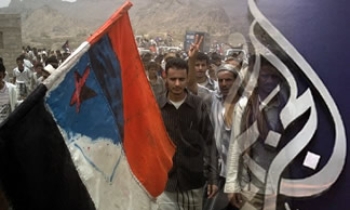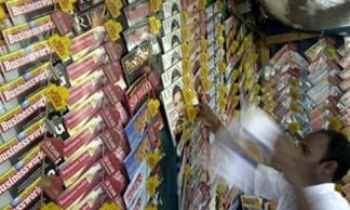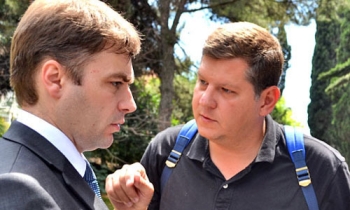At least three members of Iraq's security forces were killed Saturday in an attack on the funeral procession of an Al Arabiya journalist killed earlier in the week, the Arab television station and police said, according to Reuters.

One person was killed and four others wounded when gunmen fired on the funeral procession in western Baghdad. Two others were killed and another four wounded in a blast as it returned from the cemetery, Arabiya journalists and police said.
Iraqi police said the two were killed by a roadside bomb that hit Iraqi military cars escorting the cortege back. Iraqi Interior Ministry sources were not immediately available to confirm details of the attack.
Sectarian violence broke out across Iraq after Wednesday's attack on Samarra's Golden Mosque, one of Shi'ite Islam's holiest sites. Gunmen kidnapped and killed journalist Atwar Bahjat, a well-known Iraqi correspondent, and two of her crew while they were covering the aftermath of the Samarra bombing. The destruction of the shrine's famed golden dome has unleashed a torrent of sectarian violence that has killed almost 200 people.
Security forces accompanying Bahjat's funeral procession in Baghdad managed to regain control of the situation. "The security forces have now established control over the route of the funeral," Arabiya's correspondent reported. Bahjat was from a mixed Sunni-Shia family, but Arabiya described her and her colleagues as Sunni Muslims.
Al Arabiya showed footage of seven bodies, five in black bodybags and two covered with white sheets, near the bullet-riddled white van with a mounted satellite dish in which Bahjat and her team were travelling. It was not immediately clear to whom the four other bodies belonged.
Leading clerics have appealed for calm and the United Nations has called all parties for talks to find a way out of the gravest crisis Iraq has faced since the US war three years ago. But there was no sign of an end to the violence.
The bodies of correspondent Atwar Bahjat, cameraman Khaled Mahmoud al-Falahi, and engineer Adnan Khairallah were found Thursday near Samarra, a day after the station lost contact with the crew, editors at Al Arabiya told the Committee to Protect Journalists. Bahjat, 30, was a well-known on-air figure. She recently joined the channel after working as a correspondent for the Arabic satellite channel Al Jazeera. She was said to have resigned over remarks made by an Iraqi Shia panelist on Jazeera who said Shia Muslims who voted would be collaborating with the American occupation.

Al-Falahi, 39, and Khairallah, 36, were employees of Wasan Productions who were on assignment for Arabiya. The crew was on the outskirts of the city covering the bombing of the Shiite shrine Al Askariya, also known as the Golden Mosque. Bahjat's last broadcast was at 6pm Wednesday.
Famed for her courageous frontline reporting, Bahjat had driven towards Samarra with al-Falahi and soundman Khairallah. Bahjat actually never made it into the city because all entrances had been sealed off. She managed to send back live reports to Arabiya from a field outside Samarra, interviewing locals about the destruction of the Askariya shrine. By her third and final report, at 6pm local time, wearing one of her hallmak coloured headscarves and a gold pendant in the shape of Iraq, Bahjat spoke about the high tension in the city but appeared anxious and tired.
"She began calling us just after 6pm," Dhia al-Nasseri, a colleague at al-Arabiya's office in Baghdad told the Times. "She was worried. The place was very dangerous. She needed to get into Samarra, but the roads were blocked. It was a long way back and night was falling. She called us and various officials asking for help."
Reports from a fourth crew member, who escaped the killings, suggested some of the crowd became hostile. As dusk fell, a pick-up arrived carrying two gunmen. "The survivor said they were Iraqis with local accents," Nasseri said. The men jumped from the pick-up truck and shouted: "We want the correspondent."
Bahjat appealed to the crowd for help. None came. The gunmen began firing in the air. People fled, the fourth crewman among them. Bahjat was never seen alive again. Being half-Shi'ite was not enough to save her. Her body, and those of her two colleagues, were found by police on Thursday near their bullet-riddled satellite-dish van.









